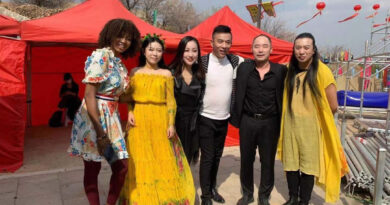Covid-19 in Sierra Leone: Bridging the learning gap through radio
Working to keep Sierra Leone’s 2.6 million students learning and positively engaged
Freetown, Sierra Leone, 24th April 2020: Seventeen-year-old twins, Alusine and Sento Kamara from Freetown in Sierra Leone, have been at home since schools closed on the 31st March 2020 as a measure to slow the spread of the coronavirus disease (COVID-19) in the country. Life at home during this period has been characterised by anxiety as well as deep longing to reunite with school friends and peers. On a typical day at this time of the year, the twins would be in school, mixing and mingling with friends while preparing to write assessment examinations which will allow them to graduate from Junior Secondary School level to the Senior Secondary School level.
“It is not fun being at home, there is very little for us to be doing here. But we want to remain healthy and that is why we stay here,” says Alusine, as he explains the anxiety of not knowing when their lives would return to the usual routine and if at all they will be able to write their examinations this year.
Although nobody knows when this period of uncertainty will end, Alusine and Sento are happy to use this time at home to continue with their studies and to prepare for examinations, thanks to the availability of educational radio school lessons. Daily, the twins take possession of the small battery powered radio set, which is normally shared among the seven members of the Kamara family, find a quiet spot in the courtyard and get engrossed in the lessons.
“Today, the teacher was teaching us about verbs,” says Sento, as she also shares her view about this unique, but exciting experience of learning through radio. “English Language is one of my favourite lessons and I am looking forward to excelling in this subject in the examinations this year.”
Conscience of the heightened vulnerabilities to learning as schools have been closed to minimize human to human contain, the Ministry of Basic and Senior Secondary Education, with support from Education Development partners, is using radio as a fulcrum for learning during this time. It is through this widely accessed communication channel that students are getting free daily lessons, while also receiving useful and accurate information about the coronavirus disease (COVID-19).
According to a recent UNESCO global estimates, over 89% of children are currently out of school because of COVID-19 closures. In Sierra Leone, the current disruption of lesson can further jeopardise an already low completion rate for junior secondary, which is at only 49 per cent. The pandemic also has the potential to worsen the numeracy and reading skills, which are already undesirably low among students across Sierra Leone. For children like Alusine and Sento, who live in deprived and disadvantaged households, the closure of schools also increases their vulnerabilities to exploitations and abuse.
Keeping Sierra Leone’s approximately 2.6 million students learning and positively engaged is therefore critical during this time when the world grapples to find solutions to bring the pandemic to an end.
UNICEF is therefore working as a part of the Continuous Learning Pillar of the Education Emergency Taskforce and collaborating with the Teaching Service Commission to develop content and programming for this all-important radio-based distance teaching to reach students such as Alusine and Sento. On a regular basis, the teachers deliver the structured lessons from a studio which UNICEF constructed and officially opened in 2018 at the Radio Broadcast House, which is at the Ministry Radio Broadcast House in Freetown.
The lessons are being rolled out by qualified teachers, who take students such as Alusine and Sento through the core subjects, English Mathematics, Integrated Sciences and Social Studies. These subjects are taught in line with the current curriculum and help to bridge a learning gap in this period of school closure.
Across town from where Alusine and Sento live, 12-year-old Denma Moore is engaged in a mathematics lesson, as she furthers her dream of becoming a banker when she graduates from school. Her father Denis, who is working from home, is next to where the learning is taking place, helping to further explain what the radio teacher is teaching.
“Parents are an important audience in the radio programs, because their engagement in school activities reinforces positive feelings about schooling,” says UNICEF Chief of Education, Celeste Staley. “Parental involvement is also an important part of the process of learning through radio as parents help to transfer knowledge and further explain the lessons which are being delivered the teachers.”
Denis explains that because he has listened to the programmes and sees their value to Denma’s learning, he can influence the assigning of the sole radio set in the household towards Denma’s learning.




